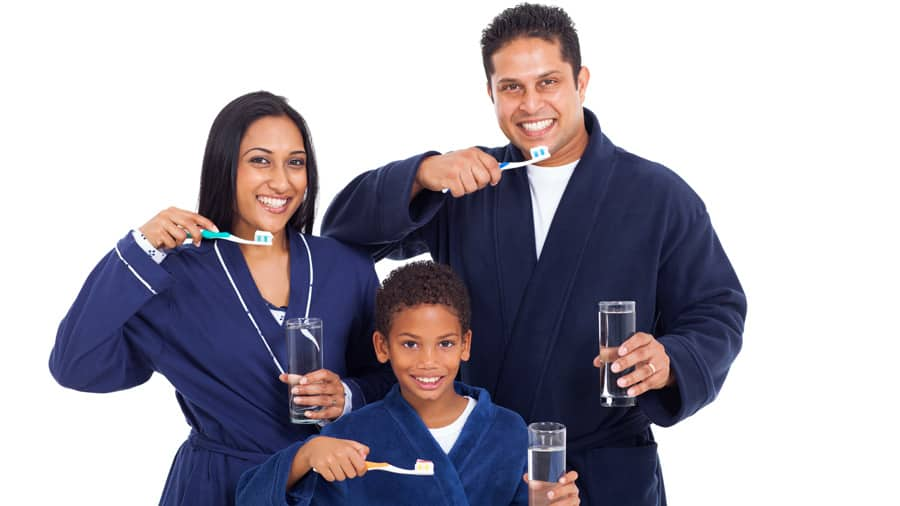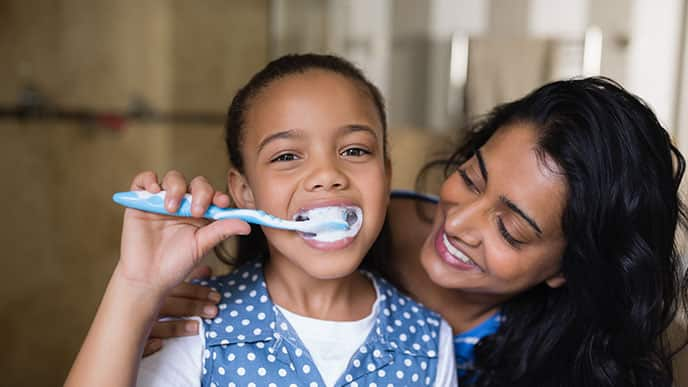Children's Toothbrushes
No matter their age, your children's toothbrush should fit comfortably in their mouths and be easy to hold and manipulate. Choose a toothbrush with soft bristles that is made of a round-ended or "polished" material. These types of brush heads clean kids' teeth well but aren't rough on their gums. It's also important that your children's toothbrush appeals to their tastes so that it's fun using it every day and night.
Babies and Toddlers
Although many parents stick with a damp cloth or gauze, you can start using a gentle toothbrush with your baby even before they have any teeth, according to the Center for Pediatric Dentistry at the Washington University School of Dentistry. Toothbrushes for babies come in bright colours and have very small heads designed to fit inside your baby's mouth. Brushing your baby's mouth keeps their gums clean and helps acclimate them to a twice-daily toothbrushing routine.
By the age of two, your toddler is likely to want to participate in toothbrushing time. Toddler toothbrushes have small heads and large handles with soft grips that are easy for small hands to hold. At this age, your tot hasn't yet developed the control to brush their own teeth effectively, but they can take a turn before or after Mum or Dad. Powered toothbrushes are available for this age range and older children, and can be engaging and fun for young children to use.
Ages Five to Eight
Between the ages of five and eight, your child is getting ready to be independent about their dental health care. Toothbrushes for kids this age have slimmer handles than toddler toothbrushes in order to suit a child's more dexterous grip and larger jaws. Young children also develop their own skills to clean their teeth effectively, according to the American Academy of Pediatric Dentistry, but still require supervision as they brush. Many toothbrushes for children in this age range (and younger) are specially designed for children 5 years of age and older who have a combination of baby teeth and adult teeth. Choosing your child's favourite character helps maintain their interest in brushing their teeth.
Preadolescence
Kids aged eight and up can actually brush their teeth themselves. Their toothbrushes look similar to adult products, but still have slightly smaller heads and larger handles. Both powered and manual toothbrushes are appropriate for preadolescent children. According to the Indian Dental Association, electric or power-assisted toothbrushes are a fine alternative to manual brushes. They are especially useful for people who don't use proper brushing techniques
Using Toothbrushes
Kids toothbrushes are essential to good oral health care, but simply buying the right toothbrush for your child doesn't guarantee they will have clean, healthy teeth. Toothbrushes should be used after breakfast and before bed, and teeth should be flossed once a day as soon as two teeth are touching. When the bristles fray and no longer stand up straight – or after three months, whichever comes first – it's time to buy a new toothbrush. Children's toothbrushes often need replacing more frequently than adults', according to the ADA.
Buying the right toothbrush for your child isn't only about making sure they have clean teeth and gums; it's about setting up good oral health habits that will last them a lifetime. Follow the age range guidelines on the packaging and involve your child in choosing a new toothbrush, so they have a brush that fits the mouth well, is comfortable to hold and that they love to use.
This article is intended to promote understanding of and knowledge about general oral health topics. It is not intended to be a substitute for professional advice, diagnosis or treatment. Always seek the advice of your dentist or other qualified healthcare provider with any questions you may have regarding a medical condition or treatment.
ORAL HEALTH QUIZ
What's behind your smile?
Take our Oral Health assessment to get the most from your oral care routine
ORAL HEALTH QUIZ
What's behind your smile?
Take our Oral Health assessment to get the most from your oral care routine








.jpg)




